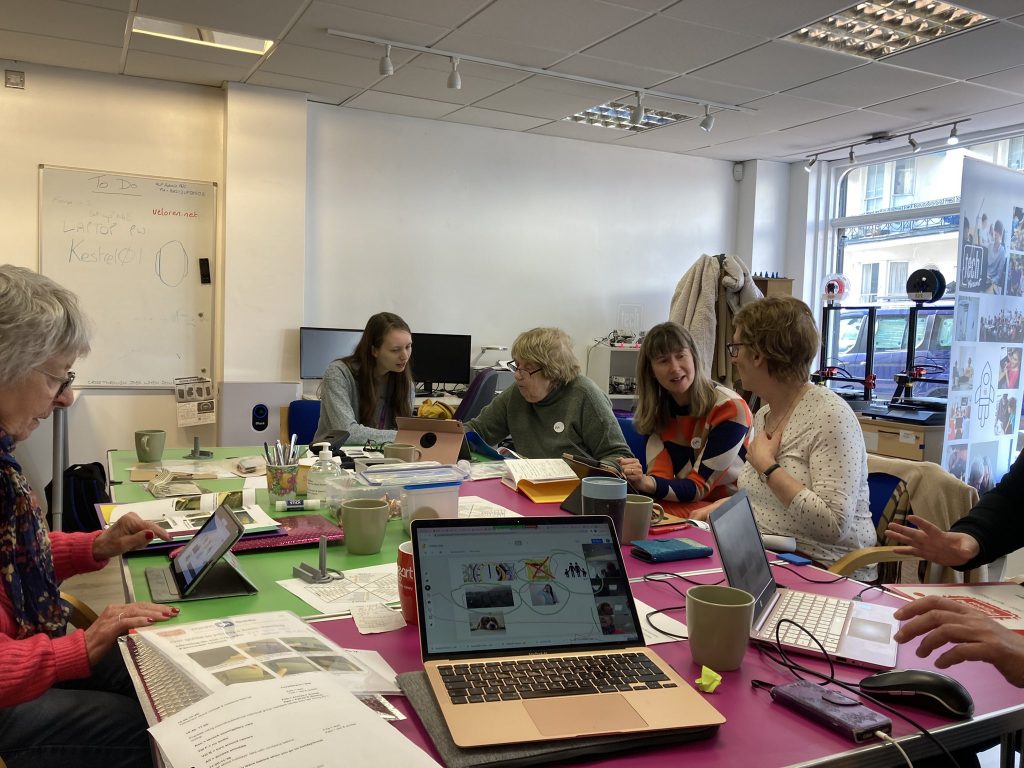When we talk about digital exclusion we tend to think about people not being able to do online banking, apply for jobs, apply for universal credit and other very practical tasks.
But we’ve learned other people can be digitally excluded in more subtle ways.
We were approached by Firle, a speech and language therapist, who works with people who have aphasia as a result of brain injuries. She was working on a project with the charity Say Aphasia aiming to reduce the sense of isolation that some people had suffered during the pandemic because they had reduced chances to meet with other people with the condition.
With the help of artist, Kate, Firle wanted to encourage a small group of people to have virtual meetings on Zoom. She knew that it could be quite tricky since many of the people might not have the digital skills, or might have to relearn them after their injury and they might also have physical issues such as weakness in their usual writing hand. All of this could conspire to make clients feel it wasn’t worth the effort.
Firle and Kate visited TechResort and we talked about various different devices, how we could all work together to try a mixture of in-person and Zoom-only sessions to help coach and motivate the group to keep going even when it was very hard work.
Firle and Kate had decided that on-screen annotation as part of an art themed activity would be a good way to motivate the group. They coupled this with some physical art making at home.
TechResort enlisted Fiona and Serena as skills coaches to support the session.
Getting started
I think it would be fair to say, the first session wasn’t without its hitches but, once we were safely assembled we made sure everyone’s devices were fully up to date for safety and we started to work with the group to help them get onto Zoom.
If you use Zoom every day you probably don’t even think about the various steps you take to do this. But now imagine you find it hard (or impossible) to read the text on the screen. Not because the text is too small, but because although your eyes can see it, your brain injury means you can’t process it.
Everyone in the group had a slightly different presentation of aphasia which meant adapting how Firle and Kate ran the activities, and how Fiona and Serena provided the support.
Providing one lady with a mouse to use with her computer – rather than the trackpad – made things a little easier for her and she quickly got up to speed. Loaning some tablet stands allowed people to steady their iPads whilst they used them.
The programme alternated in-person sessions using Zoom in TechResort’s HQ and virtual-only sessions via Zoom.
Kate used the Zoom “annotate” function extensively to encourage people to interact on line – as well as develop a bit more confidence and skill in using the application.
What we learned
It wasn’t all plain sailing. It can be really frustrating when you can’t use the application the way you want, or when your hand isn’t quite doing what you need it to but all the team worked together to reassure people, encourage and help them when they got stuck.
Building a form of “digital resilience” was key to trying to ensure frustrations and panics were kept to a minimum. We all know the frustration when a bit of software we use a lot suddenly changes – this can be heightened in people already struggling with skills.
We also made sure there was plenty of tea and biscuits to fuel the efforts and make the sessions feel sociable.
It was wonderful seeing the ladies’ skills get stronger each week, to see the stress and frustrations reduce, and to see the group bond. We felt really privileged to be involved in the project.
It has shown again just what an impact digital exclusion can have, even on things like recovery from an illness. Devices and connectivity is only half the story – skills and motivation to practice them is the other half and they’re just as important.
It’s also showed that sometimes you need to be very creative in your approach to encouraging learners to practice skills and to enjoy it whilst doing it. It’s a great model.
Thanks Firle and Kate for involving us and thanks, too, to V, V, P and A for being so up for learning and such fun to be with, even when the going was hard.

